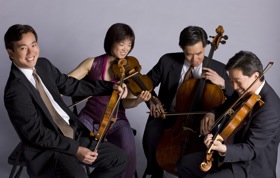
Forging a beginning in rural Iowa isn’t the only thing that makes this quartet unusual, though it certainly has played a large role in the path it has since followed. The ensemble moved there as part of a residence program with the National Endowment for the Arts, designed to bring classical music to people outside of concert halls. It was there, says Ying, that its members learned that “music is about communicating.” They played in schools, churches, homes, and even banks, and the Dvořák quartet was a fixture in their repertoire.
The quartet has since moved on to more traditional venues, such as Carnegie Hall, the Aspen Music Festival, Tanglewood, and the Sydney Opera House, and currently is the quartet in residence at the Eastman School of Music and the Blodgett Artist-in-Residence at Harvard University. But it has also kept the nontraditional venues alive, by performing in workplaces, schools, and even juvenile prisons, as well as at the White House.
To complement an eclectic choice of venues, the quartet also plays an eclectic assortment of music. While they love, in Ying’s words, the “fantastic repertoire” that chamber music offers, they’ve also made a name for themselves by playing with jazz and folk musicians, exploring the blend of chamber music with traditional Chinese music, and by commissioning music from established and emerging composers. Ying points out that one of the pluses of a small ensemble is that it can be entrepreneurial and flexible, following its own path and own stylistic explorations. “It’s scary, but being able to do what you want artistically makes it special.”
And as if all this wasn’t enough to set the quartet apart, there is the fact that the group consisted of four siblings. It wasn’t really planned that way. “We had no idea we would be playing together professionally,” says Ying. “I don’t know that we even intended to play professionally. In fact, we went to some length to avoid it. And there were many moments when we didn’t know if a family quartet seemed too much like the Jackson 5 or the Osmonds. But we always knew it would be special to try, and once we worked with the Cleveland Quartet, they encouraged us to take it one step at a time.”
So they have. Just as they moved from Iowa to the world’s best-known concert halls, the quartet has moved into a new era this year. First violinist Timothy Ying has left, but Phillip, Janet (violin), and David (cello) have found a wonderful replacement in violin virtuoso Frank Huang, who began performing with them this year. Through it all, the Ying Quartet maintains its commitment to performing exciting, innovative chamber music for everyone.

